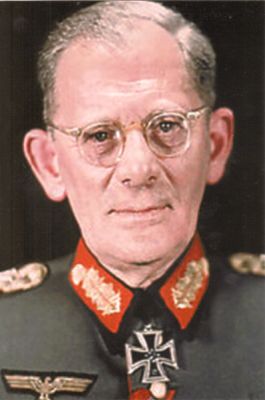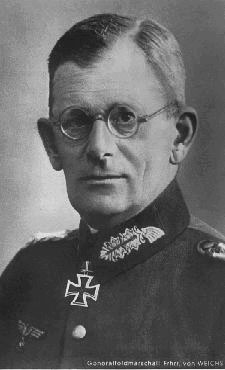Weichs, von, Maximillian
- Date of birth:
- November 12th, 1881 (Dessau/Saxony-Anhalt, Germany)
- Date of death:
- September 27th, 1954 (Bornheim/North Rhine-Westphalia, Germany)
- Nationality:
- German
Biography
Maximilian Maria Joseph Karl Gabriel Lamoral Reichsfreiherr von und zu Weichs an der Glon, born November 12, 1881 in Dessau, passed away on September 27, 1954 at Rösberg astle in Bornheim-Rösberg, was a German officer, Generalfeldmarschall from 1943 onwards and during World War 2 commander of various Armeen and Heeresgruppen.
Pre-war period
After Weichs had been promoted to Generalmajor on April 1, 1933 and simultaneously appointed 3rd Infantry Leader in Potsdam, his appointment to commander of the 3. Divison in Weimar soon followed in the same year.
In 1935, under command of Weichs, the transformation of the 3rd Cavalry Division into the 1st Armored Division was begun with. Weichs was promoted to Generalleuitnant on April 1, 1935. 18 months later he became General der Kavalerie and a year later, on October 12, 1937 commanding general of 13. Armeekorps and of Wehrkreis XIII in Nuremberg.
In the spring of 1939, Weichs and his Korps were involved in the occupation of Czechoslvakia.
World War Two
At the beginning of World War 2, during the Polish campaign, Weichs was commanding general of 13. Armeekorps and in this capacity he played a part in the capture of Warsaw. In October 1939 he was appointed Commander-in-Chief of 2. Armee and participated in the campaign in France. At the end of the campaign, he was promoted to Generaloberst on July 19, 1940.
Along with 2. Armee, Weichs participated in the campaign on the Balkans in April 1942 and he accepted the surrender of the Yugoslav Army on April 16.
At the beginning of the war against the Soviet Union on June 22, 1941, Weichs and his 2. Armee were made subordinate to Heeresgruppe Mitte. At the battle for Kiev, 2. Armee and Panzergruppe 2 were sent south temporarily in order to capture Woronesch. Medio June he took the post of commander of Heeresgruppe B from Fedor von Bock who had been fired. This Heeresgruppe was part of Operation Braunschweig which was intended to be the initial strike towards Stalingrad. After the successes of the Soviet operation Uranus in the battle for Stalingrad, the southern part of his Heeresgruppe became Heeresgruppe Don. This army was defeated and annihilated as early as the winter of 1942-1943 by counterattacks of the Red Army. February 1, 1943 saw Weichs being promoted to Generalfeldmarsachall and in July 1943 he was transferred to the Führer reserve.
Weichs re-entered service as early as August 1943 and simultaneously was named Commander-in-Chief Südost and C-in-C of Heeresgrupp F.
In the fall of 1944 he organized the retreat of the German forces from Greece and Yugoslavia during the Soviet operation against Belgrade. This was against Hitler's orders who presented this retreat to the OKH as enemy attacks.
On March 25, 1945, Weichs was transferred to the Führer reserve permanently and on May 2, 1945 he was arrested near Ettal in Bavaria by American units.
During the hostages murder trial he was indicted, along with other officers for the murder of hundreds of thousands civilians. Weichs' trial was suspended because of his poor health and he was released from captivity.
Do you have more information about this person? Inform us!
- Period:
- Second World War (1939-1945)
- Awarded on:
- September 18th, 1939
Had already received the Iron 2nd Class on September 20th 1914.
- Period:
- Second World War (1939-1945)
- Awarded on:
- September 29th, 1939
Had already received the Iron Cross 1st Class on November 12th 1915.
- Period:
- Second World War (1939-1945)
- Rank:
- General der Kavallerie (Lieutenant-general)
- Unit:
- Oberbefehlshaber der 2. Armee
- Awarded on:
- June 29th, 1940
105th Award
- Period:
- Second World War (1939-1945)
- Awarded on:
- April 11th, 1941
- Period:
- Second World War (1939-1945)
- Awarded on:
- August 7th, 1941
- Period:
- Second World War (1939-1945)
- Awarded on:
- September 23rd, 1941
- Period:
- Second World War (1939-1945)
- Awarded on:
- October 18th, 1941
- Period:
- Second World War (1939-1945)
- Awarded on:
- 1941
- Period:
- Second World War (1939-1945)
- Awarded on:
- October 19th, 1941
- Period:
- Second World War (1939-1945)
- Awarded on:
- September 10th, 1943
- Period:
- Second World War (1939-1945)
- Awarded on:
- January 19th, 1944
- Period:
- Second World War (1939-1945)
- Rank:
- Generalfeldmarschall (Fieldmarshall)
- Unit:
- Oberbefehlshaber Südost
- Awarded on:
- February 5th, 1945
731st Award
- Period:
- Second World War (1939-1945)
- Period:
- First World War (1914-1918)
- Period:
- First World War (1914-1918)
- Period:
- Second World War (1939-1945)
- Period:
- Second World War (1939-1945)
Sources
- Photo 1: Wilco Vermeer
- Photo: Wilco Vermeer collection, the Netherlands
- - THOMAS, FRANZ & WEGMANN, GüNTER, Die Eichenlaubträger 1940-1945, Biblio-Verlag, 1998.
- Die Eichenlaubträger 1940-1945, Deutsches Wehrkundearchiv, 2001
- Axis Biographical Research
- Lexikon der Wehrmacht
- Feldgrau.com - The German Armed Forces 1919-1945
- Deutsches Historisches Museum
- Hungary Officer Address and Name Directory (schematismus), March 1944














